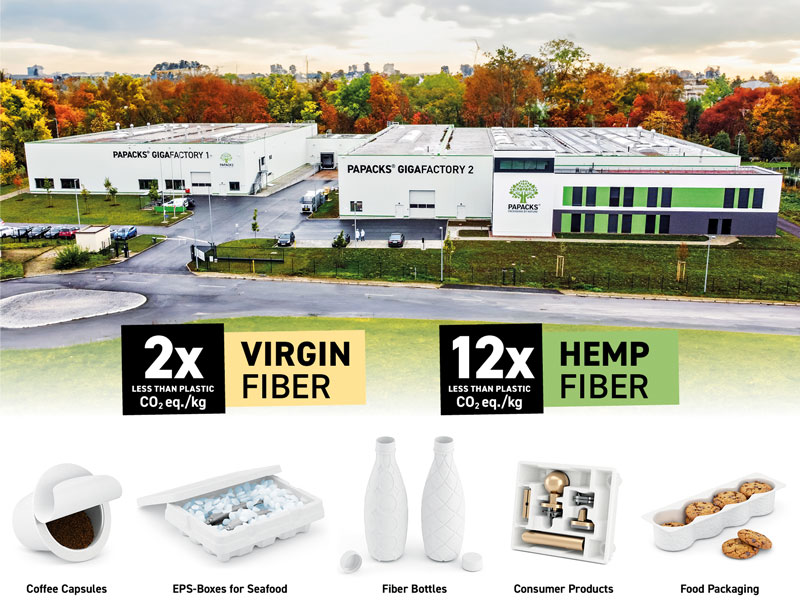
The packaging of the future will be environmentally friendly, lighter, more efficient, and driven by technological advancements. While smart packaging and the Internet of Things (IoT) offer tremendous potential for the future of packaging, the development of sustainable and eco-friendly packaging materials that can be reintegrated into existing waste cycles and are easily compostable is most important.
PAPACKS is now a leading manufacturer of moulded fibre packaging solutions, setting the standard in Europe for sustainable, fibre-based packaging. With production capacities of over 600 million units annually, we are leaders in both production volume and innovation, boasting an impressive array of over 75 patent families, 30 awards, and more than 10 years of continuous development and research. With a focus on climate protection and the conservation of natural resources, we emphasise the use of renewable raw materials and production processes, especially virgin fibres and industrial hemp. This approach enables us to make a significant contribution to reducing the CO₂ footprint, offering tangible benefits to clients and the environment alike.
By investing in sustainable packaging technologies, we can transform the packaging industry to benefit our planet
Following circular design principles, we consider all life stages of packaging – from development to disposal. A key aspect is choosing raw materials that minimise the ecological footprint, like our moulded fibre technology, which is more sustainable than traditional materials and easily recyclable or compostable. We continuously improve our packaging to reduce its ecological impact and meet circular economy demands.
Moulded fibers
Biodegradable and compostable materials are crucial for sustainable packaging, breaking down naturally without causing environmental harm. Compostable materials, especially useful for food packaging, can be fully converted into compost. Moulded pulp from renewable sources like cellulose or hemp fibres offers a sustainable, cost-effective alternative to traditional packaging, integrating easily into recycling systems.

Moulded pulp packaging is competitive in cost and performance, often providing better protection, durability, and user-friendliness. It is environmentally cost-effective, offers excellent shock absorption, is lightweight, and can be produced in various shapes and sizes.
At PAPACKS, we use compostable tree or hemp fibres for our moulded fibre technology. Our virgin tree cellulose fibre, sourced from sustainably managed forests, is high-quality but resource-intensive. Conversely, industrial hemp is a highly sustainable alternative, growing faster, using less water, and absorbing four times more CO₂ than trees. Hemp fibres match tree fibres in performance, making them an efficient, eco-friendly packaging choice that helps offset CO₂ emissions.
Avoiding rising costs and shortages
The packaging industry faces shortages of virgin fibre raw materials, and a shift to paper-like packaging will exacerbate this scarcity, driving up prices. This will increase production costs, which companies will likely pass on to customers, leading to higher consumer prices – especially problematic for industries with thin profit margins. To mitigate future cost increases due to shortages, PAPACKS, in partnership with the European Material Bank (EMBA), has planted over 2,000 hectares of industrial hemp in Ukraine. This strategic move ensures a self-sufficient supply of high-quality virgin fibre, insulating us from market fluctuations.
Investing in the future of packaging is economically crucial, and companies that do not invest will fall behind. Sustainable, innovative packaging solutions are essential to addressing plastic and waste issues and will gain industrial adoption rapidly.
As the founder and CEO of PAPACKS, I am also the president of the European Moulded Pulp Producer Association (EMPPA). In this role, I aim to unite the moulded pulp industry, promoting innovation and political awareness to support new legislation like the EPS ban. By investing in sustainable packaging technologies, we can transform the packaging industry to benefit our planet, not just corporate marketing. Further information can be found at www.papacks.com


